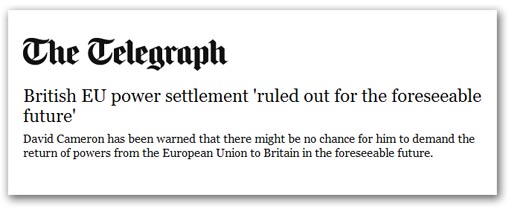The Janet and John reference here is actually to the "enhanced co-operation" process, the use of which has been signalled for some time. But, says Bruno Waterfield, using the current EU treaty to shore up Europe's single currency would rule out any opportunity for Mr Cameron to ask for new settlement bringing powers back to Britain in return for his support for deeper eurozone integration.
Why this should be news is anyone's guess, but The Daily Telegraph seems to think it is. Thus, it has been working on the basis that Mr Cameron would emerge shortly with a speech promising to renegotiate Britain's EU membership and then to offer voters a referendum on the new terms in 2015.
This timescale was never on the cards, but now Van Rompuy has confirmed that this is the case, saying that the question of treaty negotiations would not arise until late 2014. "The only possibility of having treaty changes, according to all who are in favour, is after European elections in 2014," he says.
Had the Telegraph actually taken on board earlier information, it cannot have helped but to have known this. In mid-September, we had Barroso's "state of the union" address in Brussels, when he could not have been clearer in setting out a provisional timetable.
"Before the next European Parliament elections in 2014", he said, "the Commission will present its outline for the shape of the future European Union. And we will put forward explicit ideas for Treaty change in time for a debate".
Conceding that creating the planned "federation of nation states" would ultimately require a new treaty, he said that "a deep and genuine economic and monetary union" could nevertheless be started under the current treaties. This is only what Van Rompuy is now confirming.
Back in September, Barroso had already said, "We must not begin with treaty change. We must identify the policies we need and the instruments to implement them. Only then can we decide on the tools that we lack and the ways to remedy this".
Then, he said, "there must be a broad debate all over Europe. A debate that must take place before a convention and an IGC is called. A debate of a truly European dimension".
With a convention hardly likely to take less than two years, and an IGC at least another year, the earliest we could expect a referendum would be 2017, but the following year, 2018, is far more probable. This is what we were saying in October last.
As we have always maintained, therefore, there cannot be a referendum before the general election, something which still comes as a surprise to some. But the prolonged timescale does leave Mr Cameron with something of a problem. If he is reliant on the "colleagues" opening up an IGC, he is in for a long wait, and the nation is getting impatient.
On the other hand, there seems to be a recognition – tacit at least – that the UK cannot by itself force an IGC. Thus, as was always going to be the case, Mr Cameron's "renegotiation" and referendum options are closing down. And until he get his head round Article 50, he is going nowhere.
COMMENT THREAD
